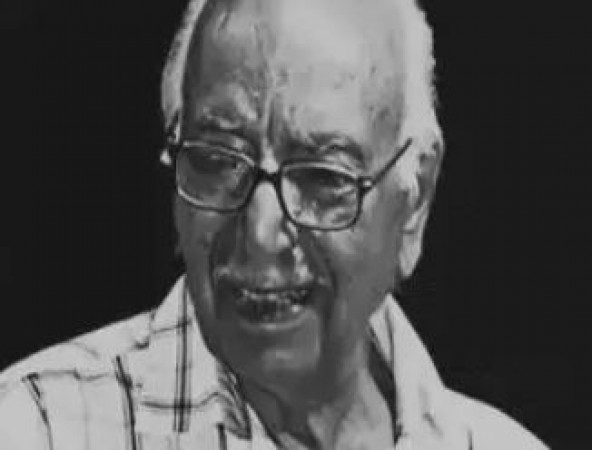
Many talented lyricists and writers who have created works of magic with their words have graced the world of Hindi cinema. M.G. Hashmat, who debuted in the Hindi film industry in 1974, stands out among them as a notable actor. The movie "Kora Kagaz" served as the catalyst for his acting debut, and from that point onward he began a successful career that left a lasting impression on Indian music and film. In-depth analysis of M.G. Hashmat's life and career is provided in this piece, which also examines his early work in Hindi film and his enduring contributions to the field of lyrics.
The family of M.G. Hashmat, also known as Mohd. Ghulam Hashmat Khan, was steeped in the rich cultural traditions of India. He was born in Kanpur, Uttar Pradesh, on October 7, 1933. Hashmat's love of poetry and writing was sparked early on by his early exposure to the literary and cultural milieu of his surroundings. He was always good with words, and it was only a matter of time before his skills were recognised.
When M.G. Hashmat made his debut as a lyricist in the Hindi film industry in 1974, it marked a pivotal moment in his life. In that year, three films—with "Kora Kagaz" standing out as the most notable—showcased his talents to the world. "Kora Kagaz," a moving drama that was directed by Anil Ganguly, explored the difficulties of marital relationships and social expectations. Kalyanji-Anandji composed the music for the movie, which featured Vijay Anand and Jaya Bhaduri in the lead roles.
"Kora Kagaz" was the ideal canvas for Hashmat's lyrical talent. Audience members connected with the movie's songs, which perfectly encapsulated the story's core and the characters' feelings. Kishore Kumar and Lata Mangeshkar's rendition of the title song, "Mera Jeevan Kora Kagaz," is still regarded as a classic from that time period. The theme of the movie was beautifully captured in Hashmat's lyrics, which also highlighted how frail human relationships are.
The commercial and critical success of "Kora Kagaz" was crucial in establishing M.G. Hashmat as a skilled lyricist in the film industry. The songs from the movie not only hit home with the audience, but also won praise from music critics. It was clear that Hashmat had the ability to express complex emotions with words, and this trait would later define his writing style.
Following the success of "Kora Kagaz," M.G. Hashmat continued to work with renowned composers and directors of photography, adding his poetic brilliance to a number of memorable films. His lyrics stood out for their profundity, poetic beauty, and capacity to elicit a wide range of feelings. Hashmat was a priceless asset to the Hindi film industry because of the ability of his words to move listeners to tears, laughter, and introspection.
The career of M.G. Hashmat in Hindi cinema was marked by a variety of noteworthy collaborations with renowned directors and composers. Songs for films like "Namak Haraam" (1973), "Mili" (1975), "Chupke Chupke" (1975), and "Bidaai" (1974) are just a few of his noteworthy compositions. Songs from each of these films made an impression on the audience.
Hashmat's lyrics for the song "Diye Jalte Hai Phool Khilte Hai" in "Namak Haraam" perfectly captured the spirit of friendship and camaraderie, deepening the emotional impact of the movie. Similar to this, "Chupke Chupke" included the well-known song "Sa Re Ga Ma," a lighthearted and catchy composition that demonstrated Hashmat's versatility as a lyricist.
M.G. Hashmat worked with numerous musicians on more than just individual songs; he also became a vital member of their creative teams. His collaborations with filmmakers like Basu Chatterjee and Hrishikesh Mukherjee influenced the narrative structure of their movies. Hashmat became a sought-after lyricist in the business because of his capacity to comprehend the subtleties of a script and translate them into moving lyrics.
The impact of M.G. Hashmat on Hindi music and film is immeasurable. Through the passage of time and generations, his lyrics continue to ring true with listeners. Even today, listeners still adore him for his ability to capture the human experience, from the difficulties of relationships to the joy of life's simple pleasures.
Another part of Hashmat's legacy is encouraging aspiring authors and lyricists to delve into the depths of their imagination. His rise from the back alleys of Kanpur to the top of the Hindi film industry is a testament to the strength of talent, tenacity, and a passionate love for the written word.
M.G. Hashmat's debut in Hindi cinema with the release of "Kora Kagaz" in 1974 signalled the start of a remarkable journey in the fields of lyrics and narrative. He is a beloved character in the history of Hindi cinema because of his poetic brilliance, emotional depth, and capacity to elicit an emotional response from the audience through his words. M.G. Hashmat may have only appeared in a few films in 1974, but his influence has endured through the years, making him an enduring icon in the Indian music and film industries. His legacy continues to serve as a constant reminder of the profound impact that words can have on both our lives and our emotions.
Iraq Independence Day: Celebrating a Century of Freedom
Kareena Kapoor's Transition from Character Choice to Addiction